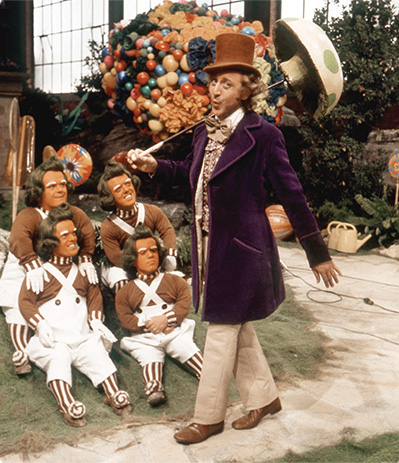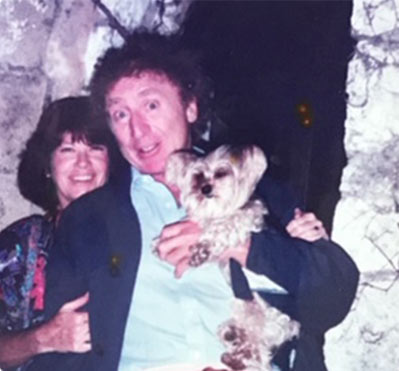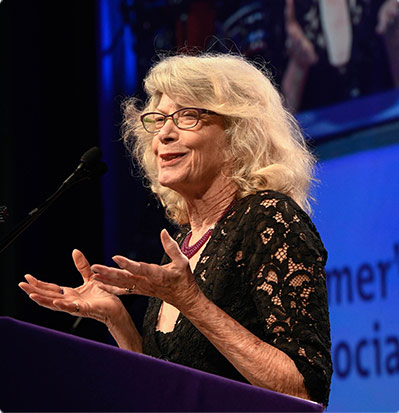
Triple Your Impact This Holiday Season
Triple Your Impact This Holiday Season
Celebrate the holidays with a year-end gift that can go 3x as far to help provide care and support to the millions affected by Alzheimer's disease, and to advance critical research. But please hurry — this 3x Match Challenge ends soon.
Donate NowLosing Gene Wilder
Karen Wilder on Her Husband Gene's Battle With Alzheimer’s
 Karen Wilder on her husband’s battle with Alzheimer’s
Karen Wilder on her husband’s battle with Alzheimer’s
Even while facing Alzheimer’s, legendary comedic actor Gene Wilder would go for laughs.
Gene’s wife, Karen Wilder, recalls an instance when Gene fell down outside and couldn’t get up. After struggling for 20 minutes, Gene paused, looked around as if addressing a packed theater audience, and enthusiastically said, “Don’t worry folks! We’ll be ready in about 20 more minutes!”
“He had the best sense of humor of anybody I know,” Karen says. “He could be very serious, but even in very serious situations he would always bring humor.”
Gene, who died of Alzheimer’s in 2016, is best known for his impressive comedy film career, starring in iconic hits like “Blazing Saddles,” “Willy Wonka & the Chocolate Factory,” “Young Frankenstein,” “Sliver Streak,” and “See No Evil, Hear No Evil.” It was while filming the latter movie that he met Karen, a speech pathologist working with the hearing impaired.
In the film, Gene plays a character who is deaf, and Karen helped him understand how to perform the part correctly. Their professional relationship turned to friendship, and then to love.
 Karen says Gene was charming and magnetic with a giving heart. During their marriage of 25 years, “I had never been so happy or so content, and I think he felt the same way. Just everything we did together was a pleasure,” Karen says.
Karen says Gene was charming and magnetic with a giving heart. During their marriage of 25 years, “I had never been so happy or so content, and I think he felt the same way. Just everything we did together was a pleasure,” Karen says.
She first noticed something was wrong when Gene’s balance and depth perception changed. On a bike ride, Gene thought they were going to crash into trees that were actually off in the distance. Then his behavior began to change, too. Typically a tender man, Gene lashed out unexpectedly at their grandson.
Soon Gene had trouble remembering things and finding the right words, often resorting to playing charades with Karen to communicate. At a party, his movie “Young Frankenstein” came up, but Gene couldn’t remember the name of the film, and had to act it out so others could remind him.
As the signs of the disease mounted, Gene agreed to have a cognitive assessment. Doctors found he had mild cognitive impairment, which eventually progressed to Alzheimer’s.
As Gene’s primary caregiver, Karen felt overwhelmed by his physical and mental transformation during the six years he lived with the disease. She especially missed their ability to have engaging conversations — something that had come so easily throughout their marriage.
“The hardest part was losing him every minute of every day. I could see him receding, and that made me sick to my stomach,” Karen says. “I held it in. I would smile and try to make things happy for him. But I was watching him disappear.”
Caregivers, take care of you, too
Staying strong emotionally and physically is the best thing you can do when caring for someone living with Alzheimer’s or another dementia.
After Gene’s death, Karen worked with a physical therapist to recover from the toll of caregiving. Mentally, she had to learn not to feel guilty when she left the house for extended periods — she was used to rushing back to make sure Gene was okay.
After losing Gene, Karen wanted to do all she could to help others facing Alzheimer’s. In 2017, she worked with the Alzheimer’s Association to use clips of Gene’s film “Willy Wonka and the Chocolate Factory” in a campaign to raise awareness. The PSA featured Gene singing “Pure Imagination” in the movie’s famous chocolate factory scene, but was altered so pieces of candy slowly disappeared.
“I thought it expressed Alzheimer’s so well, you’re fine and then things start to slip away from you,” Karen says. “If I can use my husband in a situation like that to further research for Alzheimer’s disease, that’s fabulous.”
 Hoping to learn more about the disease, Karen attended the Alzheimer’s Association International Conference 2019 (AAIC) in Los Angeles. Hearing the latest developments in research made her hopeful that treatment for the disease could one day be possible.
Hoping to learn more about the disease, Karen attended the Alzheimer’s Association International Conference 2019 (AAIC) in Los Angeles. Hearing the latest developments in research made her hopeful that treatment for the disease could one day be possible.
Though her grief will never fully go away, Karen says she has started to rebuild herself, and tries to focus on good memories of Gene. “I’ve forgotten the pain more,” she says. “I see the good scenes of our life together now more than the sad.”
